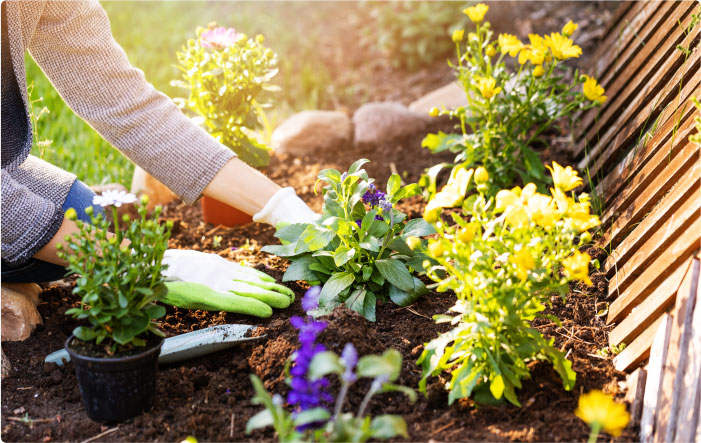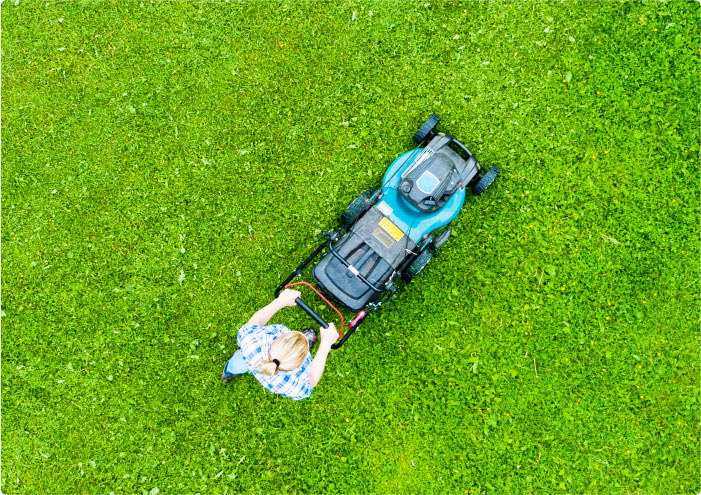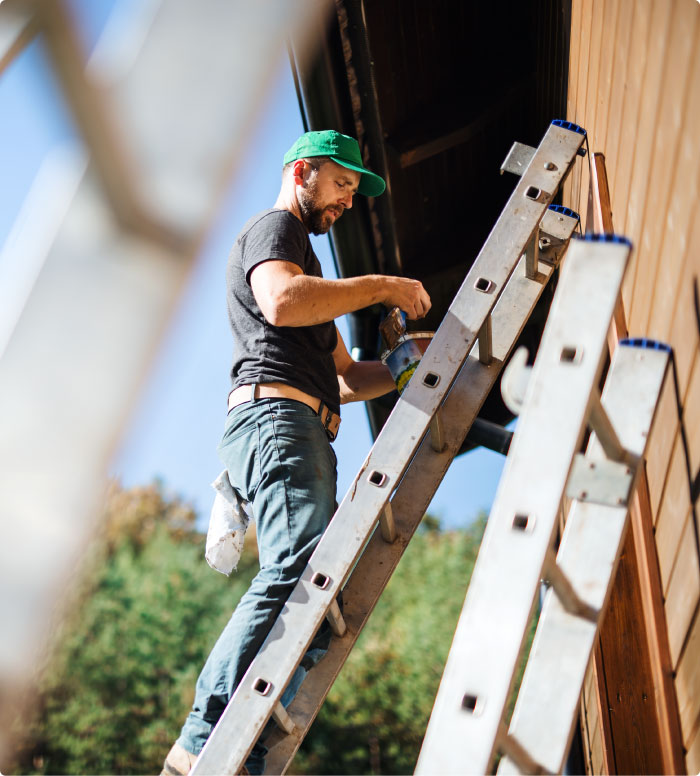Spring Cleaning and Lawn Care
Household Cleanup
- Especially in the spring and summer months, you’ll likely be cleaning out your home and preparing it for the second half of the year. While it’s important to have a neat and tidy space, it’s also important to ensure that you are disposing of materials and chemicals in a safe manner to ensure they don’t end up in your community’s storm drains.
- Check with your local recycling station to determine which materials can and cannot be recycled, and be sure to recycle anything you can while spring cleaning! Aluminum cans, aluminum foil, and other types of clean metal can typically be recycled. Even some types of glass can be recycled — just make sure to rinse them out first!
- If you’ve found old electronics stored away in your basements or closets, donate them to a local facility or see if your area has a facility that accepts used electronics for recycling. This ensures they will be safely handled and disposed of properly.
- Be sure to handle and dispose of household chemicals safely and appropriately. Try to donate chemicals and cleaners to someone who can use them. If you’re unsure of how to dispose of a cleaning project or other chemical, contact your local municipality for more information.
- If you work on your own car, you’ll need to know how to properly dispose of gasoline, oil, or any other chemicals that may be used to repair your vehicle, such as transmission fluid, windshield washer fluid, or antifreeze. If you have a surplus of these chemicals, find your local drop off point here. Many auto parts stores accept used motor oils.

Gardening and Lawncare
Stormwater Gardening
A “stormwater friendly” garden is one that uses organic compost as fertilizer to amend soil and minimizes or eliminates the use of chemical applications, helping to stabilize local water flows and prevent runoff from making its way to local water bodies. Compared to typical gardening, stormwater friendly lawns and gardens also save money in terms of chemical application costs and require less upkeep once the lawn or garden is established. By growing a stormwater friendly lawn, you’ll save money and have a better looking front yard, too.
Native Plants
Native plants are the foundation of a natural ecosystem — the kind of plants you find growing all around you outside, providing food and habitat for wildlife to live. Because they’re native to the local area, these plants are already well-adapted to thrive in their “home” environment and require a lot less water and care to grow. Native plants often need little to no fertilizer to grow, and probably require about as much water to grow as you can expect to receive in rainfall.
Rain Gardens
A rain garden is an attractive and functional piece of landscaping that’s designed to capture and filter stormwater from roofs, driveways, and other surfaces, all while beautifying the property. By collecting water, the garden reduces erosion and prevents pollutants from flowing off your property into local storm drains, and eventually lakes and rivers.
Check out our guide to build your own:
www.baswg.org/resources/rain-gardens/
Watering
The grass is greener where it’s healthy and natural!
Your lawn needs less water than you might think! Often, continual watering of your lawn (like with a sprinkler system) uses far more water than what is needed to keep your lawn green and healthy. If there has been an average rain season, there should be enough water falling through rain naturally to maintain a healthy lawn. If we’re in a drought, or even if it’s been raining a bit less than it usually does, make sure that you water your lawn responsibly. This means monitoring your water use, watering your lawn deeply to encourage root growth, and maintain a longer grass length.
Lawn Chemicals
Fertilizers
Many lawns do not need fertilizer because the soil already has enough nutrients to sustain plant growth. However, if your lawn is thin or has bare spots, you should consider fertilizing it– a densely-covered lawn is the most “stormwater-friendly” because it absorbs more water, preventing runoff. If you’re unsure of whether your lawn needs fertilizing, [test your soil for pH level and nutrients] or consult a local professional to find out. Not every lawn is the same, and knowing what kinds of nutrients your lawn needs will help you grow a healthy lawn quicker and reduce the costs in the long run.
If you do apply fertilizer, make sure to follow the instructions labeled on the product (or advice from lawncare professionals, if you’ve consulted them.) Start with a small amount of fertilizer and work your way up to higher amounts – your lawn may need less fertilizer than you think, and excess fertilizer can easily run off in the rain and pollute local waterways. If you live right next to a stream, try not to fertilize at all, as this fertilizer can easily run right into the water and damage the ecosystem of plants and animals nearby and downstream as well.
Instead of chemical-laden fertilizer, consider using organic material like compost or manure. It’s easy to make your own compost at home, or you purchase some from a local farmer and support your local economy in the process. As with any fertilizer, the best time to apply either compost or manure is right before you plant your seeds, giving them all the resources they need to grow deep roots that’ll help soak up rainwater and prevent erosion.
Pesticides
Many insects you’ll find in your garden are harmless or even helpful to maintaining a healthy garden ecosystem. However, it’s always good to be cautious – be sure to make note of what insects you find in your garden and compare them against the more common pests we find here in Maine. If you do have a problem, identify the cause and consult an expert before you spray pesticides – pesticides can infiltrate into groundwater, contaminate drinking supplies, and hurt ecosystems downstream if applied excessively.

Caring for Your Lawn
Mowing
The way you cut your grass can have a big impact on the health of your lawn. Taller grass has deeper, healthier, roots that are more resistant to disease, weeds, and drought.
- Three inches is a good height to cut your grass. The best time to cut the grass is when the mower will remove of the grass blade height. Cutting too much of the grass will make it hard for the grass to photosynthesize and cause burning.
- Leave the clippings on the ground. Not only will doing so take a lot less work on your part, but clippings are a free source of fertilizer – leaving them in place actually helps your lawn grow!
- The time of day you cut matters! Mow in the early evening after the heat of the day, but before the dew settles.
- Did you know that dull mower blades can rip and tear grass, opening up the possibility of long-term damage and disease? Next time before you mow, check out your blades to see if they’re starting to get dull. You don’t want to cause damage every time you mow!
For more tips, visit:
www.baswg.org/resources/mowing-tips
Pool Maintenance
If you have a pool, make sure you perform regular tests and drain it only when a test kit does not detect chlorine levels. Whenever possible, drain your pool or spa into the sanitary sewer system, where it will be treated. To prevent leaks and spills, make sure you store pool and spa chemicals in a covered area where they’re safe.

Home Renovation
With all the extra time Maine homeowners have been spending at their homes, many have realized how many home renovation and DIY projects they’d like to do on their house, or are now getting around to doing projects that they’ve had planned for a while. If you’re planning on renovating your home this summer, make sure you properly dispose of any chemicals and other hazardous materials you may use in the renovation process.
Paint & Paint Care
Updating your walls or furniture with a new color? Ensure that your paint and paint products are properly taken care with these tips:
- Never wash your paint cans, brushes, or other equipment out over storm drains, streets, or open ditches. Paint emptied into these areas will enter the municipal water system, constituting a water quality violation and potentially harming the water you and your community drink, use, and consume!
- Don’t buy too much paint! Only buy the amount of paint you know you’ll need for your project. If you’re left with extra paint, find creative ways to use it all, like painting trim, drawers, cabinets, or wooden furniture.
- Still left with excess paint? Return your unused paint to the store you bought it from, and they will dispose of or recycle it through a program called PaintCare. Bangor has multiple locations that accept paint returns through PaintCare — find those locations here!
- Did you know? Latex-based paint can be disposed of in your regular trash! Cat litter or sawdust can be used to absorb excess paint — before throwing it away, stir until hardened to avoid tricky messes! Just make sure to keep the lid off of the trash can in a covered area while the hardened paint is in it.
- Using oil-based paints, lead paints, or paint thinner? Brushes and pans can be washed with paint thinner, which can then be recycled by storing in a closed jar until the particles settle. The clear liquid can be reused, while the remaining sludge should be safely disposed of here or check with your local municipality to see if they host a HWW collection.
Gutters
Long Maine winters can often mean trouble for your home’s gutters. Gutters are hard at work keeping stormwater away from the foundation of your house all year long, but especially as the snow melts in the spring. Your gutters can also either alleviate pollution…or contribute to it. Here’s how you can ensure your gutters are working as they should, both for your home and your community:
- Check where the water from your downspout goes. If it flows into the street, it is likely carrying phosphorus and other pollutants into the street’s storm drains. If so, move your downspout to point into your yard or somewhere on your property that will allow the stormwater to soak into the ground. You could also consider adding a downspout extender to ensure that the rain water goes exactly where it should.
- Spruce up your lawn and help the environment by building a rain garden! If you notice a consistently soggy spot in your yard, this could be a great spot for a rain garden to collect stormwater and redirect it into the ground.
- Make sure your gutters aren’t clogged! Leaves, sticks, twigs, snow, ice, and other outdoor debris can clog your gutters and prevent stormwater from moving through them as intended. If you notice clogging or debris resting in your gutters, safely clean or maintain them to ensure that your stormwater ends up where it should.
- Install a rain barrel on your downspout for a free source of irrigation water for decorative plants and shrubs.
Construction
Home improvement projects are a great way to upkeep your home and community. Start the construction process by planning what materials are needed for the project. Use these tips to help guide your process:
- Consider saving some materials to be reused in other ways, such as reusing wood to create a raised bed garden. Only purchase what you need, so you don’t have to dispose of excess materials.
- Develop green infrastructure around larger scale construction. By installing rain barrels, french drains, bioswales and other methods, which can control the flow of water in your landscapes naturally. These methods can prevent pollutants from entering stormwater systems.
- Always dispose of chemicals such as paint thinners, glue and others during construction properly. These chemicals should not be placed in the trash or down the drain, which can enter and pollute local water bodies.
- During the construction phase clean the construction area by sweeping any dirt or debris that may have accumulated. These can be sorted and placed in the proper trash receptacle. Cleaning up can help keep any trash or toxins from storm trains, which run off into local water systems.
- Bring construction and demolition debris to a transfer station for proper disposal.


